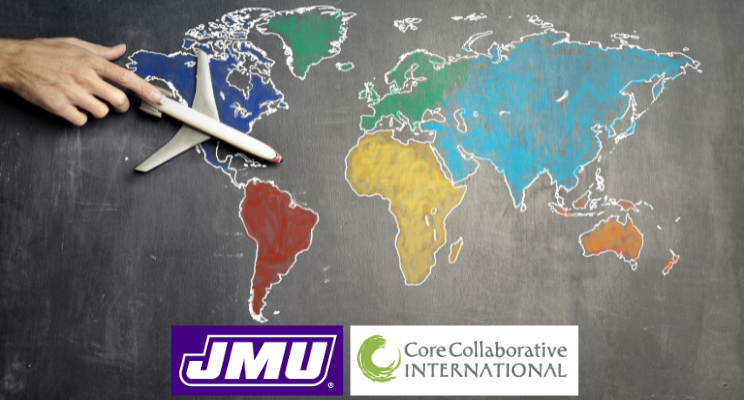In 2015, James Madison University hired CoreCollaborative International to build a set of turn-key lesson plans designed for its faculty to use in various education abroad or classroom activities. The lessons are aligned with the constructs behind the Beliefs, Events and Values Inventory (BEVI) assessment tool which was built into the curriculum, at each step, as a way of measuring student outcomes in the program. Dr. Jennifer Jones-Wiley, CoreCollaborative’s managing partner, was the lead designer of the curriculum.
The goal behind the design of JMU’s Global Studies Curriculum is to support educators charged with helping students develop the skills and knowledge they need to interact in and sustain the interconnected world they are inheriting. Different units address topics such as global education, sustainability, human rights, cultural and religious understanding, and conflict resolution – all through the lenses of self, others, and global awareness.
The curriculum is designed to be flexible, with each unit providing both targeted learning objectives and supporting resources. An index of learning objectives helps faculty find lessons that align with their own program’s specific learning goals. To maximize customizability, each lesson includes suggestions for how to modify the delivery to meet differences in settings, participants, and time constraints. Ideas are also included for targeting particular populations such as those by Education Abroad and International Student offices.
Importantly, assessment is baked into every one of the Global Studies Curriculum’s units and lesson plans, with each including methods for assessing students’ learning content and skill development along the way. The assessments are aligned to facilitate growth and development constructs assessed through the BEVI, a powerful and adaptable analytic tool. Already in use across multiple populations and settings worldwide, the BEVI helps facilitators evaluate, understand, and facilitate processes and outcomes of learning, growth, and transformation in their learners. It thus constitutes a key part of the overall learning process of this new curriculum, promoting learning objectives as it enhances teaching and program quality.
From the students’ perspective, the curriculum presents global issues through a lens that allows them to develop the skills they need to use that knowledge. It asks students to explore their own identities – which means they can increase their awareness of who they are in the overlapping contexts of which they’re part. This approach promises to help students become more effective leaders in diverse and global settings – and it also sets the curriculum apart from most student experiences in formal education.
The customizability that distinguishes this curriculum from the faculty point-of-view also operates at the student level. The curriculum acknowledges that learners come to these materials with different beliefs, values, and life experiences, all of which influence learning and skill development. In engagement with the Global Studies Curriculum, though, all learners are challenged to explore their identities within a new context, pushing themselves to acquire new skills and awareness. Learners are also encouraged to give their peers space to explore, experiment, and learn on their own terms. What’s more, sometimes the lessons are also made local, which allows and encourages students to take action within their own communities. Customizability to the individual learner and their context makes for a profoundly engaging experience for both the learner and facilitator.
JMU’s Global Studies Curriculum has been made available to all JMU faculty and administrators to use in their courses, whether at home or abroad, and it’s been taken up in different ways. For example, the content has been embedded in Global Studies Honors courses that have a study abroad component. The curriculum has also been used in a learning-living community for first-year students, in which students are encouraged to reflect on their worldviews as they enter the next stage of their lives.
CoreCollaborative International partners and affiliates have designed transformative learning materials like these for many contexts within higher education and other professional fields. Our approach puts the learner at the center of the experience while keeping in mind the goals and systems of the organization requesting the materials. Contact the CCI team to learn more about how we build custom materials designed for your context and to meet your learning goals.
